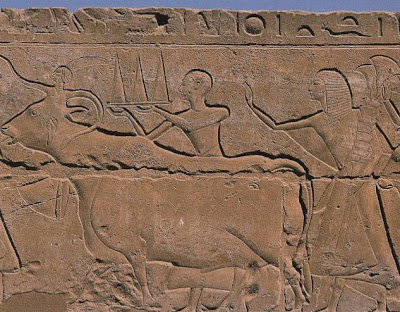 |
| Procession with fattened bulls and offerings for the great Opet festival. 19th dynasty, Luxor Temple. |
Renewal is particularly important in these festivals as their purpose was ultimately directed to the same kind of rejuvenation or rebirth achieved each day in the constant solar cycle. Thus, one of the rituals performed on New Year's Day - also called "the birth of Re" - and most fully recorded in Ptolemaic times involved carrying the
statues of deities up to the temple room. Here the god or goddess could see and be united with the rising sun in a moment of shared rebirth. Many of the same rituals and religious performances were enacted on a number of key festivals such as those of the first day of the first month (New Year) and the first day of the fifth month (celebrating the rebirth of Osiris). Some festivals had their own particularly focused meanings, of course, but renewal or rebirth was a predominant theme in a great number of them.
The power of the Egyptian gods was also tapped and order maintained by means of rituals utilized on unscheduled special occasions. This could be the kind of ritual employed in the "opening of the mouth" ceremony in order to animate a temple statue or it could be one with much wider application. The goddess Sekhmet, for example, was regarded as a potential bringer of plague and disease who sometimes had to be propitiated and her priests were often skilled in medicine. Placation could be accomplished through large-scale magico-religious rituals performed in the temples as well as through more focused rituals directed at individual sufferers. Thuse rituals for the care of humanity ultimately also served to care for the Egyptian gods.
Many aspects of the daily services, festivals and special rituals were described by the Egyptians as "mysteries" (shetau in Egyptian). In fact, by virtue of its supernatural basis, any ritual might be said to be a mystery. Most particularly, any part of a ritual which was conducted privately, beyond the view of the people at large, was given this name because it was also hidden and part of the secret knowledge of the priests and others who were skilled in its performance. A general atmosphere of secrecy was developed by the priesthood as time progressed, but in reality the same priests sometimes performed similar rituals - such as the "opening of the mouth" - in both hidden and open settings, and the boundaries between formal temple ceremonies and private ritual were probably blurred to some degree.

